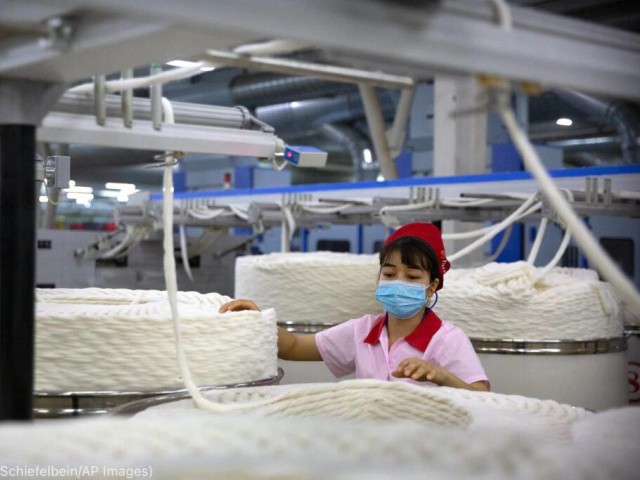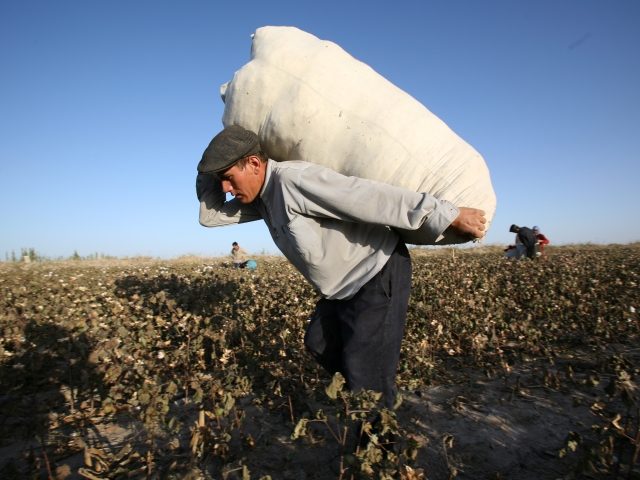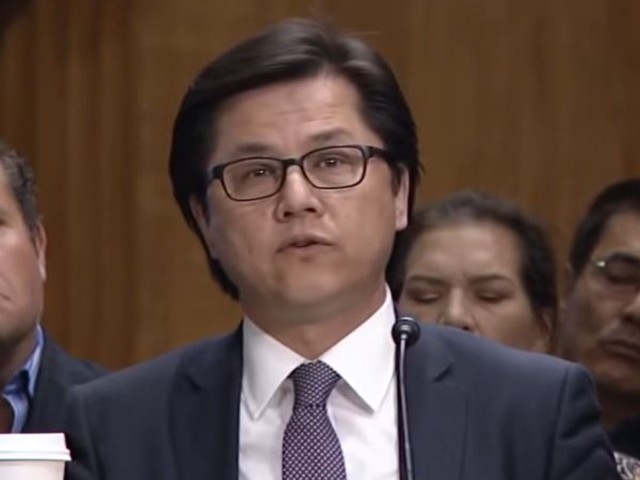The government of China announced it would make a large purchase of cotton from occupied East Turkistan for its reserves, the South China Morning Post reported on Tuesday – an apparent desperate measure in light of the implementation of an American law banning slave-made products from the region.
The Uyghur Forced Labor Prevention Act (UFLPA), which passed Congress last year and took effect on June 21, bans the import of any products from East Turkistan, which China calls “Xinjiang,” to the United States unless the potential importer can prove that no slave labor was involved in the production or manufacture of the imports. The Act became law after years of campaigning by human rights activists in Uyghur groups to try to keep products made by Uyghur slaves off of American store shelves.

A worker watches as a machine processes cotton yarn at a Huafu Fashion plant, as seen during a government organized trip for foreign journalists, in Aksu in western China’s Xinjiang Uyghur Autonomous Region, Tuesday, April 20, 2021. (Mark Schiefelbein/AP)
China is currently engaging in a genocide campaign against Uyghurs, the native population of East Turkistan, and other Muslim-majority ethnic groups in the region. The Communist Party is executing the genocide in part through the imprisonment of millions of people in concentration camps, where survivors say they endured extreme torture, rape, indoctrination into communism, and slavery, among other crimes. Extensive investigations by journalists and human rights advocates have gathered evidence indicating that significant percentages of Chinese products are now being made by Uyghur slaves and the Communist Party actively complicates the ability of companies to know the origin of what they are buying.
“Given this system of intimidation and terror both inside and outside of China, corporate supply chain due diligence is impossible,” Nury Turkel, a Uyghur-American attorney and current chair of the United States Commission on International Religious Freedom, told Congress in 2019.
The UFLPA banned all imports from East Turkistan on the grounds that proving slave labor was not involved in their production is likely impossible, with a carve-out exception for companies that can, indeed, prove that the products are clean of slavery. China’s government media outlets had previously hinted that the Act has already had a major impact on East Turkistan’s cotton industry – which produces about 91 percent of China’s cotton and 20 percent of the world’s cotton – but had yet to directly intervene to buy cotton to offset the loss in exports.
The China National Cotton Reserves Corporation (CNCRC) announced last week, according to the South China Morning Post, that it would purchase between 300,000 and 500,000 tons of cotton from East Turkistan. The Hong Kong-based newspaper stated that the UFLPA had “resulted in a massive unsold inventory: 3.3 million tonnes of cotton [that] were taking up inventory space at Xinjiang cotton mills by the end of May, which was over a million tonnes higher than it usually was that time of the year, according to figures from Beijing Cotton Outlook Consulting.”
The Post described the losses in profit as “massive.”
The CNCRC appeared to make the move in an attempt to keep the cotton industry afloat after what the Post described as a “15-month drought” in sales.
The first signs of the UFLPA having a significant effect on cotton sales surfaced even before the June 21 implementation date. The Chinese government newspaper Global Times admitted in late June that local producers in East Turkistan were seeing a dramatic drop in requests for purchases, quoting individual textile industry sources lamenting a critical financial situation. The propaganda outlet nonetheless predicted that no other country could meet global demand for cotton, so the Act would inevitably fail.
The precipitous drop in cotton sales for China is particularly notable in that it is not possible if only American companies are looking elsewhere – the UFLPA appears to have had a cooling effect on sales to much of the West as companies face concerns that American allies will pass similar legislation.
If sustained, the UFLPA appears to be having far more of an effect on the East Turkistan slave cotton industry than expected, as the law allowed for exceptions to import into America that many predicted would get used. As Ruth Ingram wrote in an article published in the Asia affairs outlet The Diplomat last week, the law “is fraught with loopholes and ambiguities, and a failure to address these could render it meaningless.” Among the major concerns that Ingram listed which might prevent the UFLPA from having an appreciable effect on the industry is the potential that fellow Western nations would continue to buy East Turkistan cotton.
“If Canada, Europe, and other countries involved in procurement refuse to pull their weight, goods will simply be redirected and the new law will have little impact on the ground,” Ingram predicted.
Another major concern regarding the way the law is written is that it only impacts products imported from East Turkistan, leaving the possibility of Chinese companies simply busing products across provincial borders and importing them from neighboring regions. Another concern – documented in a 2020 report by the Australian Strategic Policy Institute (ASPI) – revealed that the Chinese Communist Party was selling Uyghur slaves online to factories across the country, then busing the people into those factories. The study found that 82 multinational companies – including retail giants like Nike, BMW, Nintendo, and Adidas – sourced products from factories outside of East Turkistan that used concentration camp slaves to manufacture them.
East Turkistan is a major producer of cotton, but also holds significant chunks of the market share in other products, particularly tomatoes and polysilicon, a material used to make solar panels. Chinese-made solar panels dominate the American market – about 80 percent of American panels either come from China or are made elsewhere by Chinese companies. While the UFLPA applies to East Turkistan solar panels, President Joe Biden’s decision to waive tariffs on solar panels from southeast Asian nations where Chinese companies tend to manufacture them, bypassing the forced labor act, has alarmed many in the human rights community.


COMMENTS
Please let us know if you're having issues with commenting.